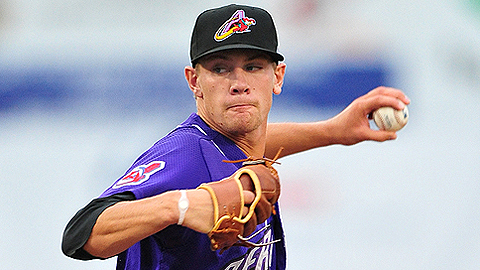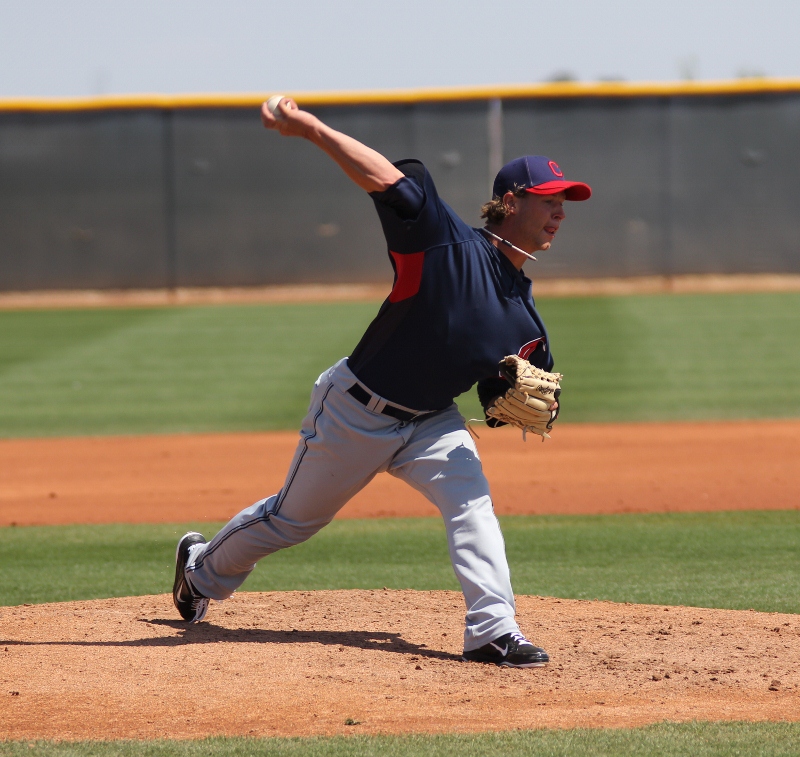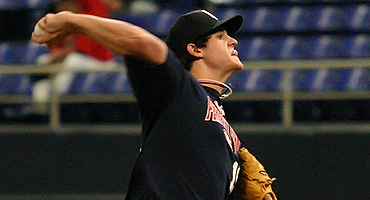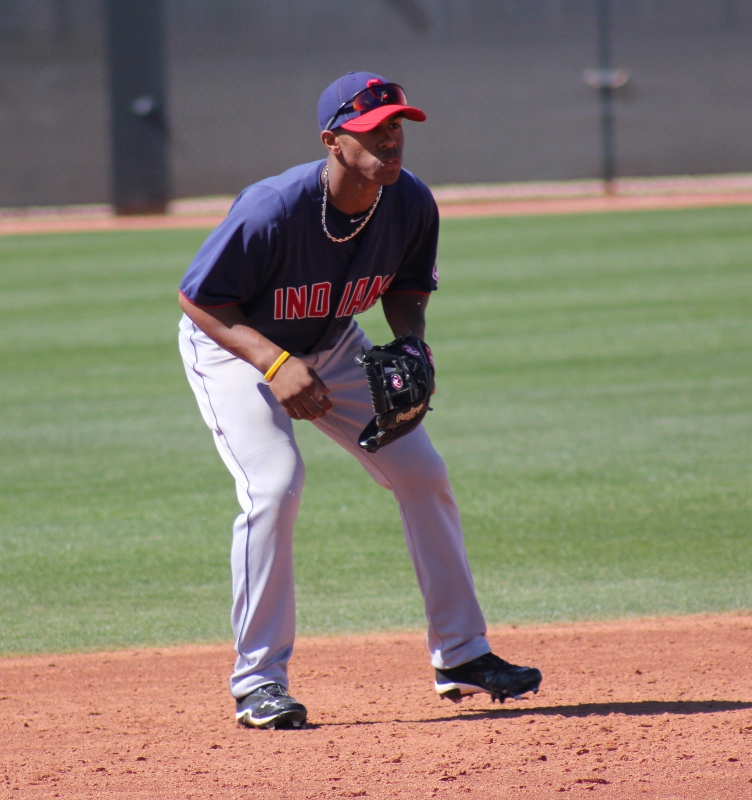 Indians Archive
Indians Archive  Cleveland Indians Prospect Countdown: #5-1
Cleveland Indians Prospect Countdown: #5-1
 Well, we've finally made it. The top of the heap. The creme de la creme. It was a long and (hopefully) entertaining road through the Indians minor league system here at The Cleveland Fan, but we've finally come to the moment you've all been waiting for as I unveil my top 5 prospects in the organization. I expect all five of these guys will contribute to the Indians at some point down the road, some sooner than others. Three of the five never played college ball, and it will probably be a while before we see them at the corner of Carnegie and Ontario. But there's a LHP and a RHP here that could be in Cleveland sooner rather than later. So without further delay, on to the top five prospects in the organization.
Well, we've finally made it. The top of the heap. The creme de la creme. It was a long and (hopefully) entertaining road through the Indians minor league system here at The Cleveland Fan, but we've finally come to the moment you've all been waiting for as I unveil my top 5 prospects in the organization. I expect all five of these guys will contribute to the Indians at some point down the road, some sooner than others. Three of the five never played college ball, and it will probably be a while before we see them at the corner of Carnegie and Ontario. But there's a LHP and a RHP here that could be in Cleveland sooner rather than later. So without further delay, on to the top five prospects in the organization.
5. Scott Barnes, LHP
DOB: 9/5/1987
Height/Weight: 6-4/185
Bats/Throws: Left/Left
Acquired: From San Francisco in the 2009 Ryan Garko trade, originally an 8th round pick of the Giants in 2008
2011 Stats: 8-4, 3.45 ERA, 88 IP, 90 K, 34 BB between AA and AAA
Scouting Report: Barnes just might end up being the biggest beneficiary of the whole Fausto/Roberto rigmarole. He was well on his way to being an option in the major league rotation last year before his season was derailed by a freak ACL tear when he was coming off the mound to field a bunt in July. The good news about the injury is that it was to his knee, and not an arm issue that could raise questions about his ability to stay healthy down the road. He’s not a guy with an incredibly high ceiling, but he also has a pretty high floor.
Barnes throws an above-average fastball that typically sits between 91-94 and has touched 96. He generally locates the pitch well, and the velocity plays up due to his somewhat deceptive delivery. In addition to the fastball, Barnes throws an above-average slider and a changeup that really dives down through the zone. It’s not an overwhelming arsenal, but it is solid in every aspect. His delivery is a little funky and creates some deception, but he does a nice job keeping it consistent and maintaining his release point from game to game and pitch to pitch. He struck out more than a batter per inning last season, and did a nice job with his control with a 3.3 BB/9 ratio.
He doesn’t have much projection left in him, and pretty much is an “is what he is” type of guy at this point in his developmental arc. But just because he doesn’t project to improve to #1 starter potential doesn’t mean he can’t be a useful cog in a big league rotation. And I think it bears repeating; we acquired him straight up for Ryan Garko. He should open the season in the AAA Columbus rotation, but don’t rule out seeing him on the bump at the corner of Carnegie and Ontario before the season is over.
Glass Half-Full: A solid #3 starter in a major league rotation
Glass Half-Empty: A solid #5 starter in a major league rotation
 4. Austin Adams, RHP
4. Austin Adams, RHP
DOB: 8/19/1986
Height/Weight: 5-11/185
Bats/Throws: Right/Right
Acquired: 5th round draft pick in 2009
2011 Stats: 11-10, 3.77 ERA for AA Akron
Scouting Report: You don’t typically see righthanded pitchers standing less than 6 feet tall in the top-5 of a teams’ prospects, but Adams isn’t your typical sub-6 foot righty. He throws harder than anyone in the system, sitting comfortably in the mid-to-high 90’s and touching triple digits when he needs to reach back for a little extra. In addition to the fastball, he throws a very nice slider that flashes plus, a decent curveball that he feels comfortable throwing at any time and is developing a changeup that still needs refined. Adams was the team’s shortstop and closer at NAIA Faulkner College, and is an impressive athlete who uses his lower half well to get maximum velocity out of his frame. In last year’s top-50 list, I said that Adams was “definitely a guy to keep an eye on, as he wasn’t seen as a top-25 guy entering 2010 but could be a top-10 guy by the time 2012 rolls around.” He’s a power strikeout guy who could develop into a front of the rotation starter.
Like most starting pitchers, Adams gets into trouble when he starts walking batters and running up his pitch count. He walked 63 hitters while striking out 131 in 136 innings pitched for the Aeros last year. When you add up all those walks and all those strikeouts, you can see how his pitch counts can add up early in some games. He only average about 5 1/3 IP per start last year, and that’s a number that simply has to come up if he’s going to remain in the rotation. He was on a pretty strict pitch count last year, and wasn’t allowed to go over 95 pitches in a game. He’ll likely open 2012 in the rotation for the Columbus Clippers, and will fight with Scott Barnes, David Huff and Jenmar Gomez to be the 1st pitcher called up in the event of an injury to one of the big club’s starting 5. If necessary, it’s even possible that he could be an impact reliever in the stretch run to the playoffs at the corner of Carnegie and Ontario.
Glass Half-Full: Adams cuts down on the walks and becomes a solid #3 or even a #2 starter
Glass Half-Empty: The control remains an issue and Adams is forced to a bullpen role
3. Tony Wolters, SS
DOB: 6/9/1992
Height/Weight: 5-10/165
Bats/Throws: Left/Right
Acquired: 3rd round pick in the 2010 draft
2011 Stats: .292/.385/.363 with 1 HR, 20 RBI and 19 SB in 69 games for Mahoning Valley
Scouting Report: Wolters is a gym rat, a grinder, and whatever else you call a kid who plays hard on the field and works hard off of it. He doesn’t have any one single tool that sticks out, but he’s solid across the board. His tools play up due to his baseball intelligence and work ethic. He was drafted out of high school, and turn 20 midway through the 2012 baseball season. He got a late start on his 2011 season after breaking a bone in his hand during spring training, but managed to put together a solid campaign for short season Mahoning Valley once he did manage to get on the field. I remember watching Wolters down in Goodyear last year when he had a cast on his hand, and the guy just couldn’t sit still. He was running around the outfield grabbing loose baseballs before the game, coaching first base during the game, and talking to any coach or player who would listen the rest of the time. I know the word “grinder” still has a negative connotation around Cleveland after Eric Wedge’s propensity to use the word as a synonym for talentless, but Wolters is a grinder who will always work to get the most out of his tools.
Wolters has an above average hit tool to go along with gap power. He’s probably never going to hit a bunch of home runs in the majors, and profiles as a top of the order hitter. He has a solid approach, with 30 walks last year against 49 strikeouts. That’s a pretty solid ratio for a kid straight out of high school in his first exposure to professional pitching. He has a short, compact stroke and does a nice job barreling the baseball on a consistent basis.
Wolters is a solid defender at short, with good hands and an above average arm. His range is average, and because of that and the fact that the Indians have so many talented young shortstops in the organization, many people see a move to 2B in the near future. His bat will definitely play at either middle infield position, and he would probably be a plus defender at second. While he never made it past short season ball last year, Wolters should begin 2012 in low-A Lake County. But the presence of top prospect Francisco Lindor at SS might force Wolters to 2B earlier rather than later.
Glass Half-Full: He sticks at SS and becomes a solid 1st division starter
Glass Half-Empty: He ends up at 2B and becomes a solid 2nd division starter
 2. Dillon Howard, RHP
2. Dillon Howard, RHP
DOB: 7/1/1992
Height/Weight: 6-4/210
Bats/Throws: Right/Right
Acquired: 2nd round pick in 2011
2011 Stats: DNP
Scouting Report: Howard was the Indians 2nd round pick (#67 overall) in 2011 out of a small Searcy, Arkansas high school. Howard went 9-1 with a 0.31 ERA his senior year, striking out 115 hitters (!) in just 58 innings of work. He allowed just 2 earned runs, and was named the high school player of the year in Arkansas by pretty much anyone that matters. He’s a big, strong kid who should be able to maintain his stuff deep into games. He made it known before the draft that it was going to take a big number for him to sign, which pushed him to the 2nd round and into the waiting arms of the Indians.
Nearly all scouts had a 1st round grade on Howard, and it’s easy to see why. He has a four-pitch mix, including a mid-90’s fastball, low-90’s sinker, a changeup that is at least average and flashes plus, and a developing curveball. The curve can get a little slurvy on occasion and flatten out, so it’s a pitch that Howard will need to work on refining as he climbs the organizational ladder. He has simple, clean and repeatable mechanics that will not need to be tinkered with when the Indians coaching staff gets their hands on him in Goodyear this spring.
In addition to his talent, Howard has a great makeup. The oldest of three sons raised by his single mother, Howard received an over-slot $1.85 million signing bonus. One of the first things he did with the money was not to buy a car, gold chain, an iPad or even a house for his mom. He sat down and found a charity in the Cleveland area that supports the fight against autism, and he wrote them a check. Howard’s youngest brother has autism, so it is clearly a cause that is near to his heart. He donated to the Milestones Autism Organization in Beachwood, Ohio, an extremely worthy non-profit organization. Even if he never throws a pitch in an Indians uniform, Howard has helped to make the Cleveland area a better place. He’ll likely pitch 2012 for low-A Lake County.
Glass half-full: A true #2 starter, or even a low-end ace
Glass half-empty: His curve doesn’t mature and he’s a back-end starter

1. Francisco Lindor, SS
DOB: 11/14/1993
Height/Weight: 5-11/175
Bats/Throws: Switch/Right
Acquired: 1st round pick in 2011
2011 Stats: .316/.350/.350 in 5 games for short-season Mahoning Valley
Scouting Report: Lindor was the top shortstop in the 2011 draft, high school or otherwise. Watching tape of him, I’m struck by just how smooth he looks, both at the plate and in the field. He’s just a natural athlete who makes even difficult plays look easy. When the Indians selected him with the #8 overall pick in last June’s draft, I tried to push “Smooth” as a nickname for him, but it never caught on. Still hoping for that to work out once more people have seen him play. Lindor is still just 17-years old, but is already a natural leader. He was the captain of his high school team, and scouts rave about his makeup both on and off the field.
Lindor has a plus hit tool, above average speed, and projects to have at least average power. He won the AFLAC Home Run Derby last year, which was held at Seattle’s spacious Safeco Field. He powered four home runs to take the title against some of the top power hitters in high school baseball. More impressively, he and the other competitors were hitting with wood in the derby, not metal. He profiles as a top of the order hitter, and a guy that could consistently hit over .300 with 15-20 home runs. He’s a switch hitter, which only adds to his versatility.
Lindor’s real selling point though, is his incredible defense. There are no questions about his ability to stick at shortstop long-term, as his range and arm are both above-average. He has outstanding hands, and makes all the routine plays as well as some jaw-dropping spectacular ones. He’s shown a consistent ability to go deep in the hole to his right and make plays, as well as ranging up the middle to his left. He can throw accurately on the move, and really flashes his athleticism in the field. In case you can’t tell, I really, really like Francisco Lindor. He’s a consensus top-50 prospect in all of baseball, and with a strong season he could push his way into the top-10 by next offseason. Despite his youth and inexperience, the Indians will likely get aggressive with Lindor and start him at low-A Lake County to begin 2012.
Glass half-full: A perennial all-star, gold glove shortstop
Glass half-empty: A solid defensive shortstop that never hits enough to be elite
- NBA Announces 2013-2014 Schedule
- Browns Ink Sharknado
- Sharknado A No-Show For Rookie Camp
- Trent Richardson Out Until Training Camp
- Browns Sign Brandon Jackson
- Carrasco Suspended Eight Games
- Browns Add to Wide Receiver Depth with David Nelson
- Browns Need to Learn from Past Draft Mistakes
- Browns Release Chris Gocong and Usama Young
- Browns Missing on Grimes Disappointing, But Not The End
The TCF Forums
- Chris Grant's first 3 drafts
Kingpin74 (Tuesday, January 21 2014 10:13 AM) - The 2014 Offseason Thread
googleeph2 (Tuesday, January 21 2014 9:36 AM) - 2015 Recruiting
furls (Tuesday, January 21 2014 6:57 AM) - Mike Brown
YahooFanChicago (Monday, January 20 2014 11:15 PM) - Movies coming out
HoodooMan (Monday, January 20 2014 9:34 PM) - 2014 Hoops Hockey Hijinx
jpd1224 (Monday, January 20 2014 4:44 PM) - 2014 Recruiting
jclvd_23 (Monday, January 20 2014 2:26 PM) - Wish List - #4 Pick
Hikohadon (Monday, January 20 2014 1:26 PM) - Official- Browns Coach Search/Rumors
OldDawg (Sunday, January 19 2014 6:48 PM) - #1 overall pick Anthony Bennett
TouchEmAllTime (Sunday, January 19 2014 1:28 PM)



